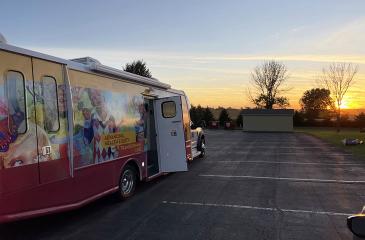Throughout the year, the University’s Mobile Health Initiative recruits and trains health sciences student volunteers to work with under-resourced communities in the Twin Cities and around the state.
In October, several students volunteered at an end of season health fair for migrant agricultural workers in Owatonna, which was held in partnership with the Tri-Valley Opportunity Council Steele County Public Health. Community members received COVID-19 and flu vaccinations. With supervision of University faculty and health care professionals, the students provided dental care and preventative care including wellness checks and physicals, diabetes education and screening, and prescription refills and free over the counter medications.
Harkirat Singh, a third year student in the School of Dentistry, volunteered because he wanted to learn more about setting up a basic dental mobile setting and providing treatment using minimal resources.
“Volunteering with the Mobile Health Initiative is an opportunity to put into practice what we learn in school,” said Singh. “As a mobile health event volunteer, I learned more about using silver diamine fluoride and how to use a portable recliner chair as a dental chair. It feels nice to be able to help serve a community that otherwise has difficulty accessing dental services.”
Altair Alonso, a second year Medical School student, says she learned how many people can truly benefit from mobile clinic operations, and how heavily these clinics may be relied on, particularly by communities disproportionately affected by barriers within the health care system.
“Immigrant health is something I take very personally because of the experience of my own family,” said Alonso. “I know that volunteering is a way I can contribute right now and directly impacts an immigrant population that often does not have a wide variety of options for health care.”



